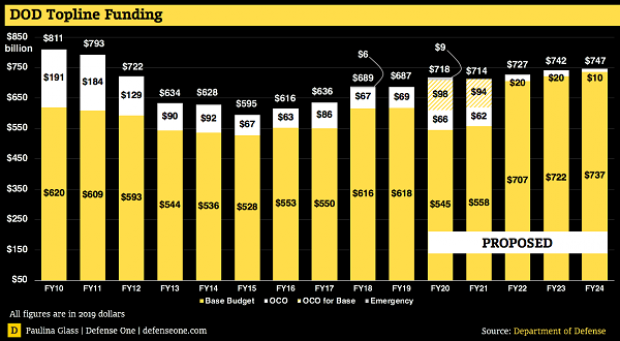Testifying before Congress on Thursday for the first time since stepping into the top leadership role at the Pentagon, Acting Secretary of Defense Patrick Shanahan defended his department’s $718 billion budget request for 2020 against accusations that it deployed a budget gimmick to boost its top line.
Members of the Senate Armed Services Committee focused on the $164 billion request for the Overseas Contingency Operations account, which includes $98 billion for basic Pentagon activities unrelated to war-fighting. The OCO account is not subject to budget caps that may take effect in 2020, and shifting money into the account would allow the Defense Department to reduce its base budget request to $545 billion while still receiving an overall funding boost (see the chart from Defense One below).
"You're asking at least for $98 billion for things that have nothing to do with contingency operations," Sen. Elizabeth Warren (D-MA) told Shanahan. "What we're really talking about here is the establishment of a slush fund to hide what is happening with defense spending."
Shanahan, a long-term Boeing executive who served as Deputy Secretary of Defense starting in 2017 and was elevated to his current position when James N. Mattis stepped down from the role in December, said the Pentagon was simply trying to be transparent with Congress. He admitted that the additional money added to OCO request for 2020 and 2021 should be in the regular budget but denied that the OCO was operating as a slush fund.
The acting defense chief also pushed back against reports that said the U.S. was asking allies to fully cover the cost of U.S. troop deployments in their territories while paying a premium of as much as 50 percent for the privilege.
"Senator, we won't do cost plus 50 percent," Shanahan said to Sen. Dan Sullivan (R-AK). “We’re not going to run a business, and we’re not going to run a charity. The important part is that people pay their fair share — and payment comes in lots of different forms. It can be contributions, like in Afghanistan,” Shanahan said. “But at the end of the day, people need to carry their fair share, and not everyone can contribute, but it is not about cost-plus 50 percent.”
And Shanahan tussled with senators over the fate of military construction funds that are being shifted to pay for the construction of the border wall. Lawmakers wanted details on which construction projects would be cut or delayed, but Shanahan said that he didn’t have all of the information and would send it to the senators later in the day.





